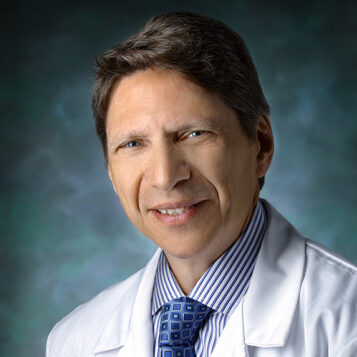
Drew M. Pardoll, M.D., Ph.D.
M.D. – The Johns Hopkins School of Medicine
Ph.D. – The Johns Hopkins School of Medicine
Abeloff Professorship, Department of Oncology
The Johns Hopkins University School of Medicine
CRB-I, Room 444
1650 Orleans Street
Baltimore, Maryland 21231
Phone: (410) 955-7866
E-mail: [email protected]
Research:
Keywords: T cell responses, Immunotherapy, cancer immunology
Our laboratory focuses on the regulation of antigen specific T cell responses and studies approaches to modify these responses for immunotherapy. We have a particular interest in cancer immunology and our studies on basic immunologic mechanisms have led to the development and design of a number of cancer vaccines, some of which are currently being tested clinically. Specifically, the interests of the laboratory fall into four areas:
1. Immunologic Tolerance
One of the important revelations in the area of cancer immunology is that the major mechanism by which tumors grow unchecked by the immune system is their ability to induce tolerance among mature T cells specific for tumor antigens. Our studies using transgenic mouse models have indicated that the same mechanisms that induce tolerance to peripheral tissue specific antigens likely are responsible for tolerance induction to tumor antigens. In particular, we have developed experimental evidence for the existence of a dedicated bone marrow derived “tolerizing” antigen presenting cell (APC) responsible for processing and presenting cell tissue and tumor antigens to induce tolerance. We are currently using a combination of molecular and cellular approaches to identify the characteristics of the tolerizing APC and to understand the molecular basis for its capacity to induce antigen specific tolerance rather that activation of T cells.
2. Antigen Presentation
One of the cancer vaccine approaches that are being actively tested clinically is the vaccination with tumor cells transduced with the GM-CSF gene. These vaccines appear to be particularly potent because of the ability of the locally produced GM-CSF to activate the differentiation of bone marrow progenitors into dendritic cells. Using subtractive library approaches, we have been in the process of mapping out genes unique to dendritic cells that mediate their potent T cell stimulatory capacity. We are also defining cellular pathways by which exogenous antigens endocytosed by dendritic cell progenitors can enter the MHC class I processing pathway. Understanding these aspects of dendritic cell biology is central to the development of newer generations of more potent vaccines for both cancer as well as infectious diseases.
3. Definition of Immunodominant and Immunorelevant Tumor Antigens
Ultimately, we wish to define the biological and biochemical rules that determine which antigens are dominant targets for immune responses. We are currently using genomic approaches to rapidly screen for genes encoding antigens recognized by tumor specific T cells. In animal tumor models in which we have defined such antigens, we are studying the correlation between binding and physical properties of altered peptide ligands in vitro and immunogenicity in vivo.
4. Dissection of Immunologic Effector Pathways
Our studies on GM-CSF gene modified tumor vaccines have led to the identification of novel effector pathways in tumor immunity. Besides the classical CTL response, we have found that activation of the eosinophils and activation of macrophages to produce NO and superoxides are critical pathways of tumor killing. Using in vitro systems for the chemical generation of these mediators, we have been defining molecular pathways by which these mediators specifically induce apoptosis in tumor cells. Ultimate definition of these effector pathways should lead to an understanding of how different antitumor agents can be utilized in synergy to effect enhanced antitumor immune responses. Relative to these immunologic effector mechanisms, we are engineering new generations of targeted vectors, which will carry biologically active genes directly to tumors in vivo with the idea of inducing a cascade of apoptotic responses.
Publications and Interests: https://jhu.pure.elsevier.com/en/persons/andrew-mark-pardoll
Learn More
Contact Us
Miller Research Building
Suite 631
733 North Broadway
Baltimore, Maryland 21205
Office: (410) 955-2709
Email: [email protected]

